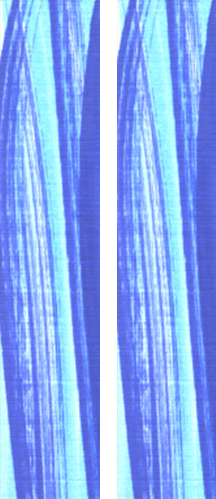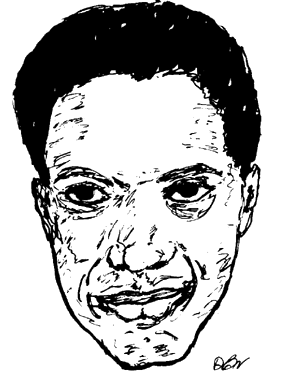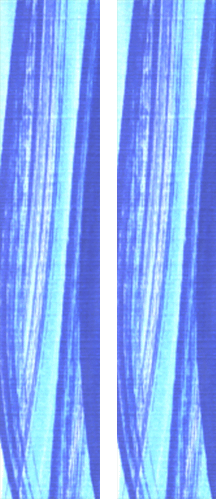

Sam Cooke
Daddy B. Nice's #4 ranked Southern Soul Forerunner


 |
||||

|
Sam CookeDaddy B. Nice's #4 ranked Southern Soul Forerunner |

|
||
|
|
"A Change Is Gonna Come" Sam Cooke Composed by Sam Cooke June 1, 2014: Artist Guide Update with new YouTube offerings and other links. (Scroll down to Tidbits #2 for complete list of YouTube offerings.) ********** To instantly link to all the awards, citations and other references to Sam Cooke on the website, go to Cooke, Sam, in Daddy B. Nice's Comprehensive index. ********** Listen to Sam Cooke singing "A Change Is Gonna Come" on YouTube. "I was born by the river In a little tent." All of the most beautiful, stately, epic-scaled songs of Southern Soul descend from Sam Cooke's "A Change Is Gonna Come." Tyrone Davis' "Where Are You Lady." Carl Sims' "Trapped" and "Mr. Nobody Is Somebody Now." Johnnie Taylor's "Soul Heaven." Lee Fields' "I'll Put My Life On The Line." Glen Jones' "Baby Come Home." Even Sir Charles Jones' "Friday." They all strive and in various ways succeed at planting their feet in the bigger, deeper footsteps first set down by Sam Cooke. "A Change Is Gonna Come" contains arguably the two most powerful lines in 20th-century songwriting: "It's been too hard living, But I'm afraid to die." The closest anyone has ever come to the exquisiteness and depth of the song's emotional pitch was Otis Redding in "Dock Of The Bay." But "Dock Of the Bay" is a solitary man's meditation. "A Change Is Gonna Come" is the full ritual, a man preaching from a gutter pulpit, a spiritual and social event even though it's so intensely personal. Yet, on its simplest, most literal level, it's the taunt of every down-and-out panhandler who ever tugged at your sleeve and your conscience outside the local supermarket. "I go to the movie, And I go downtown. Somebody keeps telling me, 'Don't hang around.' " . .And I say, 'Brother, help me please.' But he winds up knocking me. Back down on my knees." This is poverty, indigency and despair rendered with such heartbreaking simplicity and conciseness that it becomes a beautiful thing in itself. And the superb melody and full-blown orchestral arrangement accomplish the rest, transporting the listener from the curb and the parking lot to a more celestial realm. The message is one of undiluted suffering, yet the effect is religious. Certainly no song has ever captured so well the anguish of the human spirit when hope itself seems unobtainable. But the very fact the song goes to the edge, stares into the abyss and proceeds to confront us implies a bravery that couldn't exist without hope. Otherwise, why would Sam Cooke communicate it? So while the narrator's predicament appears hopeless, the effect of the song is just the opposite. Somehow it compels us to believe. It lifts our spirits and brings out the best in us. We can actually feel those "better" inner qualities quivering, like bears coming out of hibernation after months of inactivity. Much of it has to do with the originality and resonance of the music. Inspired, according to Cooke himself, by Bob Dylan's trail-blazing anthem, "Blowin' In The Wind," "A Change Is Gonna Come" is a much more complex and interesting song musically. Its wall-of-strings arrangement is one of the most famous musical prologues in popular music, and the rich texture of the violins and (later) the horns flows effortlessly around and back into the Cooke vocal, which is itself so elemental it seems to exist in a pure musical state, without tics, mannerisms or distracting flaws of any kind. "A Change Is Gonna Come" is Sam Cooke's most important song and achievement; it's also his most influential work from a Sounthern Soul perspective. But it's not the only influence. A subtler and probably more pervasive influence has been Cooke's party songs, his "light" work: "Having A Party," "Keep Moving On," "Chain Gang," "Twistin' The Night Away" and the like. The lineage of Southern Soul songs descended from the soul "party" as defined by Sam Cooke would have to include, among others: David Brinston's "Party 'Til The Lights Go Out," Lee "Shot" William's "Somebody's After My Freak," Frank Mendenhall's "Party With Me Tonight," Theodis Ealey's Stand Up In It," Mel Waiters' "Hole In The Wall," and The Love Doctor's "Slow Roll It." --In short, most of the Southern Soul party classics of the last decade. Young people might raise their eyebrows at the inclusion of "Chain Gang" in a list of "light" songs. But your Daddy B. Nice grew up to "Chain Gang," and I know the effect it had on both the high-schoolers and the grade-schoolers, as we were called then. People danced to "Chain Gang." People sang along with the words. People swayed and twisted to its lilting Caribbean beat. The gymnasium sock-hoppers took the words ironically, as Sam Cooke's vocal seemed not only to permit but encourage, the dancers mimicking every "Oooh!" and "Ahhh!" with their own timed cries and contortions. It was also a frequent line-dance song, cued up behind the Diamonds' "The Stroll," whose tempo was only a bit slower. This was mainstream America, if there is any such thing, a school up north as far as you could get--both geographically and culturally--from the chitlin' circuit. But unlike today's balkanized and tragically detached-from-its-audience music industry, the fifties' and sixties' music scenes brooked no exclusions and no favorites, black or white. And therefore, unlike today, if we listened to the radio enough and stayed up late enough, we got to hear it all. (All of Cooke's most popular party songs, by the way, were produced by Italian New Yorkers, Hugo and Luigi.) If it was good enough to hum, if it was good enough to dance to, it played on the air waves. Much of that had to do with artists like Sam Cooke. Cooke transcended what had been called "race" music, just as the Beatles and Bob Dylan would transcend what had been called pop and folk music. But contrary to what some chroniclers imply, he wasn't the only popularizer of soul music in its broadest terms. Cab Calloway had inspired countless musicians and fans (right down to the present day--that's where Busta Rhymes got his facial expressions), and Louis Armstrong had blazed a pioneering path through mainstream listening tastes, bringing an armchair-easy comfort level with R&B to all who were willing to see beyond the red herring of "jungle music." Nat King Cole was Cooke's immediate predecessor, and his fans cut cross all ethnic borders. Considered tame now, his early work and early performances (when he distinctly resembled this era's Snoop Doggy Dog) cut across all racial borders, and singers like Johnny Mathis, Fats Domino, Lou Rawls and Harry Belafonte were not only wildly popular but extremely influential and successful. Cooke, though, defined a kind of soul music, a distinctly new and original sound, that the others only hinted at. And in the next few years thousands of young, aspiring, African-American singers (and not a few Caucasion ones) would listen to Cooke's music and think, "Hey, I could do that." Listen to the "Crossing Over" Documentary About Sam Cooke on YouTube. The contemporary reader needs to be reminded that rock and roll was the stepchild of R&B: black-influenced popular dance music geared to the white young. Consider a rock and roll classic like Eddie Cochran's "C'mon Everybody," which rock critic Dave Marsh has called the "greatest invitation to a party" in rock and roll. Cochran's irrepressible rocker was simply another expression of the seemingly tossed-off Cooke standard, "Having A Party." Sam Cooke's compositions and vocal stylings spawned all the greatest soul acts of the sixties--the Temptations, the Supremes, the Four Tops, the Impressions--and his influence continued in the seventies with bands like the Delfonics, the Blue-Notes and the Commodores. In a more Southern Soul vein, Cooke plowed the way for Gladys Knight, Brook Benton, Clarence Carter and Johnnie Taylor. The first and perhaps most significant popular Sam Cooke song was "You Send Me." Without "You Send Me" (1957) there would have been no "Stand By Me" by Ben E. King (1961), and without those two soul classics there would have been, for example, no Chi-lites' "Have You Seen Her" (1971). One could make any number of similar diagrams tracing soul music's lineage back to Cooke originals. Cooke's "You Send Me" was followed by "Wonderful World," "Chain Gang," "Cupid," "Nothing Can Change This Love," "Twistin' The Night Away," "Little Red Rooster," "Frankie and Johnny," "Another Saturday Night," "Send Me Some Lovin'," "Good News," "Good Times" and "Shake" on the popular charts: hits across the nation and, eventually, the world. Not that any of them came close to the posthumous breakthrough represented by "A Change Is Gonna Come." Cooke's masterwork peaked at mid-chart in "Billboard," even though Percy Sledge's "When A Man Loves A Woman" (which leaned on it, or shall we say, learned from it) soared to the top a year later. Cooke's career can be said to have had three phases--the gospel period, the rock and roll period, and the period we can only imagine, the period of unrealized expectations, the period of musing on all Sam Cooke could have done if he hadn't died so abruptly. While Sam Cooke pre-dates almost every other soul musician (that's why he's so often referred to as the first), he nevertheless was cut down in mid-career. Thus he'll always be remembered as a young man, full of unrealized potential, a man who barely scratched the surface of his artistry. At times like these, it's best to open the R&B bible to the page and verse that goes something like this. . . "Sam Cooke begat Marvin Gaye, who begat Curtis Mayfield, who begat Al Green, who begat Stevie Wonder. . . " That's probably enough--and in any case, that's the way it is. --Daddy B. Nice About Sam Cooke Sam Cooke was born in one of the most renowned of all delta-blues towns, Clarksdale, Mississippi, in 1931. His father, a Baptist minister, moved the family to Chicago, where--before he was even a teen--the young Sam was singing in a gospel group called the Singing Children with his siblings. A few years later, the teen-aged Sam joined another gospel group, the Teen Highway QC's, where his talent gained an even larger audience.
Song's Transcendent Moment Impossible to say. The entire song is transcendent. Tidbits 1. January 19, 2007.
If You Liked. . . You'll Love If you loved the Impressions' "People Get Ready," and somehow lived this long without ever hearing Sam Cooke, you'll love Sam Cooke's, "A Change Is Gonna Come."
Honorary "B" Side "Having A Party" |

|
©2005-2024 SouthernSoulRnB.com All material--written or visual--on this website is copyrighted and the exclusive property of SouthernSoulRnB.com, LLC. Any use or reproduction of the material outside the website is strictly forbidden, unless expressly authorized by SouthernSoulRnB.com. (Material up to 300 words may be quoted without permission if "Daddy B. Nice's Southern Soul RnB.com" is listed as the source and a link to http://www.southernsoulrnb.com/ is provided.) |
 |